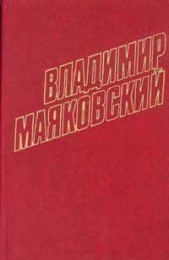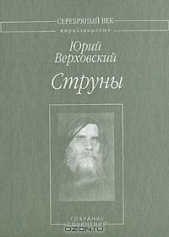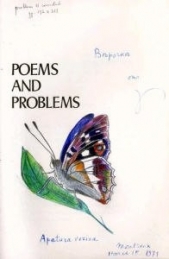444–445. FROM EUGENE ONEGIN
1 {*}
I
«My uncle has most honest principles:
when taken ill in earnest,
he has made one respect him
and nothing better could invent.
To others his example is a lesson;
but, good God, what a bore
to sit by a sick man both day and night,
without moving a step away!
What base perfidiousness
the half-alive one to amuse,
adjust for him the pillows,
sadly present the medicine,
sigh — and think inwardly
when will the devil take you?»
II
Thus a young scapegrace thought,
with posters flying in the dust,
by the most lofty will of Zeus
the heir of all his relatives.
Friends of Lyudmila and Ruslan!
The hero of my novel,
without preambles, forthwith,
I'd like to have you meet:
Onegin, a good pal of mine,
was born upon the Neva's banks,
where maybe you were born,
or used to shine, my reader!
There formerly I too promenaded —
but harmful is the North to me.
III
Having served excellently, nobly,
his father lived by means of debts;
gave three balls yearly
and squandered everything at last.
Fate guarded Eugene:
at first, Madame looked after him;
later, Monsieur replaced her.
The child was boisterous but nice.
Monsieur l'Abbé, a poor wretch of a Frenchman,
not to wear out the infant,
would teach him everything in play,
bothered him not with stern moralization,
scolded him slightly for his pranks,
and to Letniy Sad took him for walks.
IV
Then, when tumultuous youth's
season for Eugene came,
season of hopes and tender melancholy,
Monsieur was ousted from the place.
Now my Onegin is at large:
hair cut after the latest fashion,
dressed like a London Dandy —
and finally he saw the World.
In French impeccably
he could express himself and write,
danced the mazurka lightly,
and bowed unconstrainedly —
what would you more? The World decided
he was clever and very nice.
V
All of us had a bit of schooling
in something and somehow:
hence education, God be praised,
is in our midst not hard to flaunt.
Onegin was, in the opinion of many
(judges resolute and stern),
a learned fellow but a pedant.
He had the happy talent,
without constraint, in conversation
slightly to touch on everything,
keep silent, with an expert's learned air,
during a grave discussion,
and provoke the smiles of ladies
with the fire of unexpected epigrams.
VI
Latin has gone at present out of fashion;
still, to tell you the truth,
he had enough knowledge of Latin
to make out epigraphs,
descant on Juvenal,
put at the bottom of a letter vale,
and he remembered, though not without fault,
two lines from the Aeneid.
He had no urge to rummage
in the chronological dust
of the earth's historiography,
but anecdotes of days gone by,
from Romulus to our days
he did keep in his memory.
VII
Lacking the lofty passion not to spare
life for the sake of sounds,
an iamb from a trochee —
no matter how we strove — he could not tell apart;
dispraised Homer, Theocritus,
but read, in compensation, Adam Smith,
and was a deep economist:
that is, he could assess the way
a state grows rich,
and what it lives upon, and why
it needs not gold
when it has got the simple product.
His father could not understand him,
and mortgaged his lands.
VIII
All Eugene knew besides
I have no leisure to recount;
but where he was a veritable genius,
what he more firmly knew than all the arts,
what since his prime had been to him
toil, anguish, joy,
what occupied the livelong day
his fretting indolence —
was the art of soft passion
which Naso sang,
wherefore a sufferer he ended
his brilliant and tumultuous span
in Moldavia, in the wild depth of steppes,
far from his Italy.
<1964>
2 {*}
XXXII
Diana's bosom, Flora's dimple
are very charming, I agree —
but there's greater charm, less simple,
— the instep of Terpsichore.
By prophesying to the eye
a prize with which no prize can vie
'tis a fair token and a snare
for swarms of daydreams. Everywhere
its grace, sweet reader, I admire:
at long-hemmed tables, half-concealed,
in spring, upon a velvet field,
in winter, at a grated fire,
in ballrooms, on a glossy floor,
on the bleak boulders of a shore.
XXXIII
I see the surf, the storm-rack flying....
Oh, how I wanted to compete
with the tumultuous breakers dying
in adoration at her feet!
Together with those waves — how much
I wished to kiss what they could touch!
No — even when my youth would burn
its fiercest — never did I yearn
with such a torturing sensation
to kiss the lips of nymphs, the rose
that on the cheek of beauty glows
or breasts in mellow palpitation —
no, never did a passion roll
such billows in my bursting soul.
XXXIV
Sometimes I dream of other minutes
by hidden memory retold —
and feel her little ankle in its
contented stirrup which I hold;
again to build mad builders start;
again within a withered heart
one touch engenders fire; again
— the same old love, the same old pain…
But really, my loquacious lyre
has lauded haughty belles too long
— for they deserve neither the song,
not the emotions they inspire:
eyes, words — all their enchantments cheat
as much as do their pretty feet.
<Весна 1945>

























